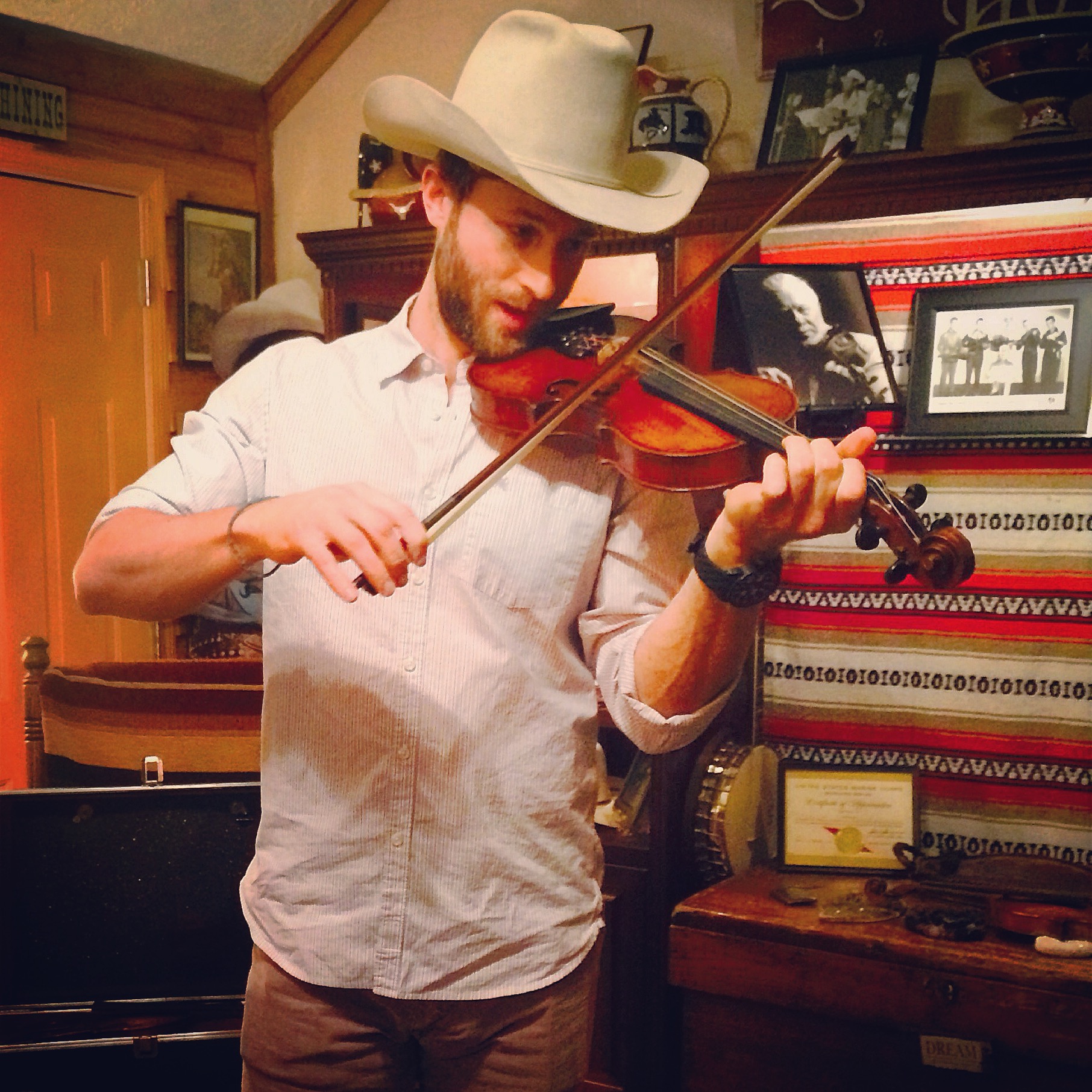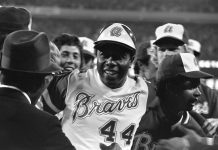
Photograph by Joanna Brooks.
When Casey Bond landed his first acting gig, the agent who helped him book it called him “the luckiest son of a gun I’ve ever met.” Bond, who had a previous career as a minor league baseball player, turned to acting on a whim, but he’s had astonishing success. Four months after that first job—a men’s vitamin commercial—Bond snagged a role in the Brad Pitt-Jonah Hill film Moneyball. Now the Nashville-based actor is playing fiddler Jerry Rivers in I Saw the Light, a biopic of country legend Hank Williams. We recently spoke with Bond about his surprising career trajectory, learning to play the fiddle, and his love of Alabama football.
You grew up in Peachtree City and attended Starr’s Mill High School. Was acting on your mind at all back then?
No, I was super focused on sports and in particular baseball. I’ve always loved music and movies and the arts. But becoming a pro baseball player is what I wanted to do ever since I was five years old. After playing at Starr’s Mill, I went to college at Birmingham Southern in Alabama. Long story short, they went from a Division I school to a Division III, which was only the second or third time that had happened in NCAA history. It left the entire athletic program scrambling. The players were like, “We can either finish school here and get our degree, or continue our athletic career at another school.” My best friend, who’s also from Peachtree City, and I transferred to Lipscomb University in Nashville and played our senior year there. And then we both got drafted by the San Francisco Giants. We both finished our baseball careers at the same time, and he actually does modeling now. Somehow we both had that spark of the entertainment industry in us, I was just a little more into the acting side of things.
So how exactly did you get into acting?
I was in Nashville during the off-season with one of my other best friends, who also played baseball at Birmingham Southern. He’d played baseball professionally, too, but had gone on work in medical sales. We decided to see a movie, I think it was Pineapple Express. Afterwards we sort of turned to one another and said, “Man, this seems fun! Let’s go find a class or something and see if we can do it.”
I attended one acting class here in Nashville, and then right afterwards the Giants released me from the team. I had offers to play elsewhere, and but by that point, I wasn’t sure if I loved baseball so much that I was willing to just grind, grind, grind through the minor leagues. I wanted to travel, to do other things.
I had an aunt in California who was an actress back in the day, and she connected me with an agent, who told me, “I can get you into a closed audition for a commercial here in L.A.” I’m completely naïve, thinking man this is a great opportunity. I didn’t know there were thousands of auditions every day in L.A. He said, “You gotta be here in two days. It’s for One-a-Day men’s vitamins.” I flew out to L.A., did the audition, and flew back the same day to Nashville. A week later they wanted to see me again for a callback. I didn’t even know what that was. When I booked the gig, the agent said, essentially, “You’re the luckiest son of a gun I’ve ever met.”
It got me into the Screen Actors Guild—the first thing I auditioned for. For me, that was a sign that maybe it’s time to move on from baseball. The friend who I took the acting class with, he quit his job in medical sales, and we packed up his car and drove to L.A. and got an apartment there. He moved back after two months, and I stayed for 5 ½ years. Four months into it, I booked the role in Moneyball. And that’s what really launched my career.
What made you eventually decide to relocate back to Nashville?
As somebody from the South, I really want to be a part of what’s happening down here with the Southern Hollywood. I moved to L.A. and then they built a freaking studio in my backyard [Pinewood].

Photograph courtesy of Sony
Your big break was playing pitcher Chad Bradford in Moneyball, during which you got to use your baseball training. Now you’re portraying Jerry Rivers in I Saw the Light. Did you have to learn to fiddle?
Yes—from scratch. They originally had me audition for a different role, a guy named Luck York, who was the bass player in the Drifting Cowboys. Then they came back and said, “Actually we’re thinking about you for another role, Jerry Rivers, the fiddle player. Can you try to learn something and get [a tape] back to us by tomorrow?” I guess it was that athlete mentality, I was like, “Yeah. I’ll do it.”
I rented a fiddle from a violin store here in Nashville. I started watching YouTube videos, and I called a friend of a friend who was a violin major at Belmont. In less than 24 hours, I learned the intro to the song “Jambalaya,” and I learned how to play along to “Move It On Over.” I filmed it, sent in [the tape], and I got the role.
Of course, then I had to learn all the Hank Williams songs in the movie. But they did something really cool: they hired a guy named Chris Scruggs, whose grandfather was Earl Scruggs. He’s like a country music legend. He came over to my house every day to teach me how to play all those songs. It was really cool to learn a new instrument and know that I was going to be playing it in this movie about Hank Williams, who I’ve always loved.

Photograph courtesy of Casey Bond
Did you do any other research on Rivers before shooting?
I did as much as I could. Chris Scruggs is like a walking dictionary of country music, so he was a great resource. And we hung out with a guy named Buddy Spicher, who is a famous fiddle player in Nashville, and he played with Jerry and knew him well. So I was able to ask who [Jerry] was, what kind of guy he was, how he played.
After we finished filming, Jerry Rivers’s granddaughter reached out to me on Twitter and said, “I heard you’re playing Jerry in the film, and his widow lives in Nashville and my family’s there, and we would love to have you over for dinner.” I was like, “Ahhh, I wish I could have done this before we filmed.” But they cooked me an amazing meal, told me stories about Jerry and Hank, and showed me all this really cool stuff of Jerry’s: old pictures that no one’s ever seen, and his old fiddles, including the one he used to record those original Hank Williams songs. I thought, Man this has been in the studio, and this is what we’re hearing when we hear Hank’s songs.
You’re producing and acting in a forthcoming movie, My Many Sons, about Lipscomb basketball coach Don Meyer. How did that project come about?
I graduated from Lipscomb, and once they found out that I had this role in Moneyball, they asked me to do a private screening [on campus]. While I was there, a couple of guys from the university started talking about Coach Don Meyer. I knew he was a legend on campus, although I didn’t realize the extent of his status. They were saying, “Gosh, somebody’s got to do a movie about Coach Meyer. His story is so amazing.” I was like, “Yeah, yeah, I’ll keep my eyes open.”
Then when I got back to L.A., I started to look up more about him. He won an ESPY award and became the winningest coach in NCAA history, passing Bobby Knight. And how it happened after a huge car wreck when he should have died. I was like, “Man this is so inspirational.” And his coaching style, he was all about developing his players’ character and turning these boys into men. Those were the kinds of coaches that I had, where it went beyond the wins and was more about the person. And it just clicked for me.
And now you’ve got your own production company, right?
Once I latched on to the Don Meyer idea, I called up a friend of mine named Brad Wilson, who has been producing for more than 30 years. He used to run Robert Duvall’s production company. I told him, “I need your help. Because I’ve never produced a movie before.”
In the process of working together, we realized that we had a lot of similar ideas about the kinds of movies we wanted to [make]. Uplifting, inspirational, [with] good messages. So we formed our own production company, called Higher Purpose Entertainment. I was a business major in school, and [developing projects] gives me the opportunity to not be waiting on a phone call all the time.
Switching gears, I noticed on your website that you wrote a poem about the Iron Bowl. What inspired that?
First of all, let me say that I don’t just sit around and write poetry. But back in 2013, I had just watched the Iron Bowl, and if you’re an Alabama fan, that was a crushing loss. A few weeks later, I’m on a flight to Birmingham, and I’m thinking about the game. All the sudden rhyme schemes started coming into my head. I sat there and cranked out this poem in 20 minutes. I was like, “I don’t know what that was, but I think this is pretty good.”
How is it that you’re an Alabama fan and not a Georgia fan?
To be completely honest, growing up, Georgia just never stuck. I had plenty of friends who were UGA fans, plenty who were Tech fans, but I never really felt die-hard about any of it. And then going to school in Birmingham, we didn’t have a football team at Birmingham Southern. But 30 minutes down the road is Tuscaloosa, so we ended up going to quite a few of those games, and the fans were incredible. That’s when I knew: this is my team.
You can follow Casey Bond on Twitter and Instagram at @caseybond.













